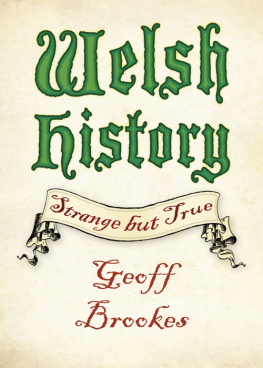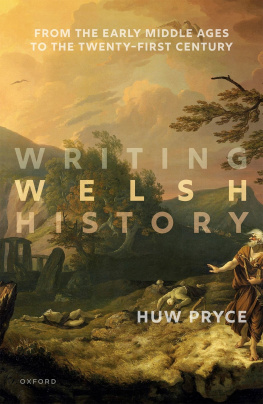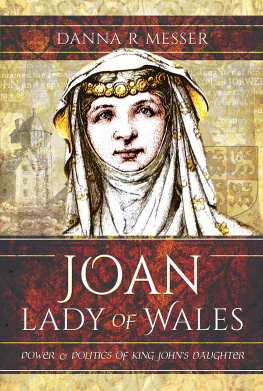URBAN ASSIMILATION IN
POST-CONQUEST WALES
ETHNICITY, GENDER AND ECONOMY
IN RUTHIN, 12821348
by
MATTHEW FRANK STEVENS
Published on behalf of the
University of Wales
Matthew Frank Stevens, 2010
All rights reserved. No part of this book may be reproduced in any material form (including photocopying or storing it in any medium by electronic means and whether or not transiently or incidentally to some other use of this publication) without the written permission of the copyright owner except in accordance with the provisions of the Copyright, Designs and Patents Act 1988 or under the terms of a licence issued by the Copyright Licensing Agency Ltd, Saffron House, 610 Kirby Street, London, EC1N 8TS. Applications for the copyright owners written permission to reproduce any part of this publication should be addressed to The University of Wales Press, 10 Columbus Walk, Brigantine Place, Cardiff, CF10 4UP.
www.uwp.co.uk
British Library Cataloguing-in-Publication Data.
A catalogue record for this book is available from the British Library.
ISBN 978-0-7083-2249-9
e-ISBN 978-1-78316-401-1
The right of Matthew Frank Stevens to be identified as author of this work has been asserted by him in accordance with Sections 77, 78 and 79 of the Copyright, Designs and Patents Act 1988.
Cover illustration:
Blacksmiths wife forging nails. Image taken from Holkham Bible Picture Book The British Library Board. Add. 47682, f.31.
Since the foundation of the series in 1977, the study of Waless history has attracted growing attention among historians internationally and continues to enjoy a vigorous popularity. Not only are approaches, both traditional and new, to the study of history in general being successfully applied in a Welsh context, but Waless historical experience is increasingly appreciated by writers on British, European and world history. These advances have been especially marked in the university institutions in Wales itself.
In order to make more widely available the conclusions of original research, much of it of limited accessibility in postgraduate dissertations and theses, in 1977 the History and Law Committee of the Board of Celtic Studies inaugurated this series of monographs, Studies in Welsh History. It was anticipated that many of the volumes would originate in research conducted in the University of Wales or under the auspices of the Board of Celtic Studies, and so it proved. Although the Board of Celtic Studies no longer exists, the University of Wales continues to sponsor the series. It seeks to publish significant contributions made by researchers in Wales and elsewhere. Its primary aim is to serve historical scholarship and to encourage the study of Welsh history.
This book has been a very long time in the making. It began its life as my University of Wales, Aberystwyth, Ph.D. thesis, researched and written between 2001 and 2005 under the supervision of Professor Phillipp R. Schofield, whose encouragement and genuine interest in my research have profoundly shaped my desire to discover the ordinary lives of the peoples of medieval Wales and England. The core of the text presented here remains that of my Ph.D. thesis, and so the acknowledgements included at the front of that document have been reproduced below. Additionally, I must acknowledge the support of those who helped me along the sometimes arduous path which has transformed my thesis, through several rewrites and the addition of much new research, into the book presented here which nonetheless still bears the hallmarks of a student learning to write history. These include the Economic History Society, without whose generous financial support I would never have got underway, everyone at the University of Oxford who made me feel so welcome during my time there, and the very good friends I have been fortunate to know since moving to the city and University of London, where I have been kindly employed by the Centre for Metropolitan History. In particular, I must thank Mark Merry for his help with the maps, Guy Geltner and Hannes Kleineke for their comments on parts or all of early draft manuscripts and, above all, Ralph Griffiths who so generously offered meticulous and invaluable advice on each draft of this book, and who has done so much to make my prose more intelligible. All remaining mistakes are, of course, my own.
London
March 2009
Where can one begin in acknowledging his debts to all those who have offered support and guidance in a project which has taken years to complete? Most immediate is the huge debt I owe to my supervisor, Professor Phillipp Schofield of the University of Wales, Aberystwyth, who has been both knowledgeable and understanding throughout, having a good sense of humour and a great deal of patience. Similarly patient and helpful has been Sarah Powis, whose efforts to help me resolve countless issues of grammar and spelling have been a blessing to me. More broadly, I need to thank both my American friends (most particularly Warren Love, Matthew Bernosky, Jason Msadoques and Howard Simmerman, whose campaigns and adventures have always inspired me) and my closest British friends (Jamie Tedford, Richard Jones and Richard Cordle, among many others) who have kept me sane and made me feel welcome over the last eight years. Likewise, I have always appreciated the support given to me by Patricia Henninger, who shares my interest in places abroad. Lastly and most importantly, I am grateful for the unflagging love and guidance of my mother and father, the latter of whose advice whatever makes you happy son is the most straightforward and valuable I have ever received (and by the way, this makes me happy).
Aberystwyth
CONTENTS
| AC | Archaeologia Cambrensis |
| AHR | Agricultural History Review |
| BBCS | Bulletin of the Board of Celtic Studies |
| Black Book | J. W. Willis-Bund (ed.), The Black Book of St Davids (London, 1902) |
| BL | British Library |
| Caernarvon Court Rolls | G. Jones and H. Owen (eds), Caernarvon Court Rolls, 13611402 (Caernarfon, 1951) |
| CC | Continuity and Change |
| DHST | Denbighshire Historical Society Transactions |
| *Dyffryn Clwyd Database | R. R. Davies and Ll. B. Smith (eds), machine readable database, The Dyffryn Clwyd Court Roll Database, 12941422 (Aberystwyth, 1995) |
| EconHR | The Economic History Review |
| HWJ | History Workshop Journal |
| JBS | Journal of British Studies |
| JFH | Journal of Family History |
| JHG | Journal of Historical Geography |
| JIH | Journal of Interdisciplinary History |
| LHR | Law and History Review |
| NLW | National Library of Wales |
| PP | Past and Present |
| RMS | Reading Medieval Studies |
| THSC | Transactions of the Honourable Society of Cymmrodorion |
| **TNA | The National Archives |
| TRHS | Transactions of the Royal Historical Society |
| UHist | Urban History |
| UHY | Urban History Yearbook |







